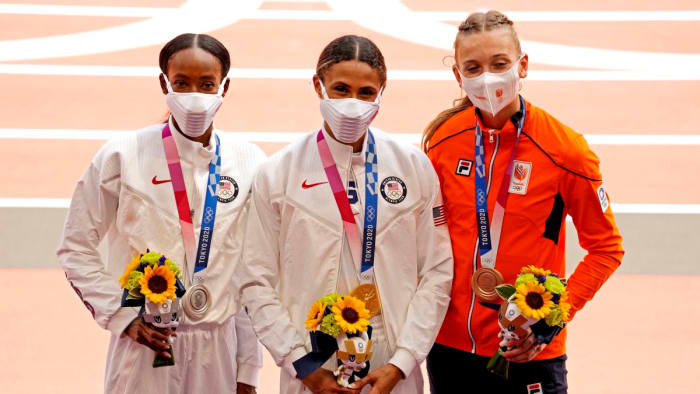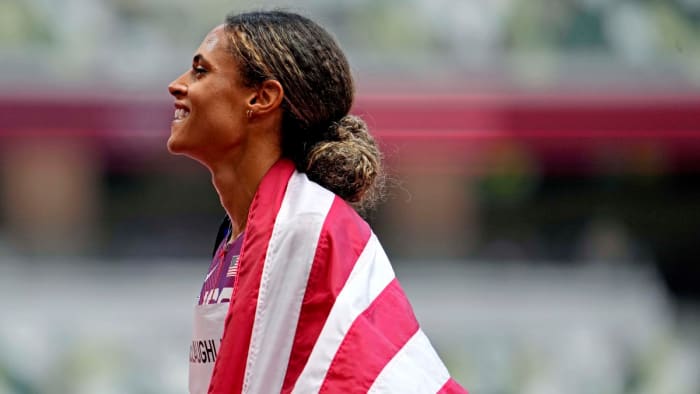World Record-Breaker Sydney McLaughlin Captains U.S. Track and Field's Youth Movement
TOKYO — Their shared history portended more of the same, more Olympic history, more track and field history. This wasn’t certain when the women’s 400-meter hurdles final began on Wednesday morning, half an hour before high noon. But it was possible, even expected, when Sydney McLaughlin and Dalilah Muhammad lined up for their lap.
For two years now, the American hurdlers had lowered their times against each, passing elite marks back and forth like a bread basket at the dinner table. They made doing something that had literally never been done before looked easy. Most break bread. These two break world records, at most every major event they race.
Muhammad, 31, started the whole affair at nationals in 2019, running a full lap, while leaping over hurdles, in 52.20 seconds. Not even three months later, she shaved 0.04 seconds off that mark, building on the gold she snagged at the Rio Games. But every epic athlete needs an equally ambitious rival, someone to push them to heights unseen. If that athlete is younger, driven, friendly and from the same country, the drama between them only heightens.
Enter McLaughlin, the phenom from New Jersey who’s still only 21. She wasn’t born when a hurdler clocked the first world record in 1974, breaking 57 seconds. It took three years to break 56 seconds, four years to break 55, 10 years to break 54 and 12 years to break 53. But from 1986 to 2021, no 400-meter hurdler ran that race in under 52 seconds. Not until this June, when McLaughlin did, wrestling the record from her rival with a 51.90.

Dalilah Muhammad (USA) celebrates winning the silver medal, Sydney McLaughlin (USA) celebrates winning the gold medal and Femke Bol (NED) celebrates winning the bronze medal during the Tokyo 2020 Olympic Games.
James Lang/USA TODAY Sports
Both women flew to Tokyo to, well, set the record straight. Both believed they could not only win but win and make history, and both should have believed that. Their back-and-forth had become so compelling that it morphed into a centerpiece showdown for the entire Olympics. McLaughlin attempted to temper the hype on Monday, after winning her semifinal by the length of a semi-truck. She said she wanted to focus on her lane. She said nothing is guaranteed when a race starts. She noted, quite fairly, that the times she and Muhammad had run were harder to obtain than they made it look. Still, “anything’s possible,” she said.
The world of track knew better, expecting something special to unfold. So did Muhammad, who said the anticipation threatened to overwhelm her. David Neville won bronze in the 400 in 2008, in the same Games when his 4X400 relay team seized gold and set an Olympic record. He promised the 400-meter hurdles were “going to be epic,” adding that he hoped to see the world record drop once more.
Introductions began at 11:27 a.m. here. There were kisses blown, fists thrown, and so many hands waving not at a crowd in an empty stadium but at the television cameras beaming the face-off to the world. McLaughlin, though, did none of those things. Instead, she swayed back and forth, hands on hips, no smile, no kiss, her stare steeled and straight ahead. She almost looked mad, from the intensity and focus.
Back in Jersey, her father, Willie, settled in front of the flatscreen in his living room, along with his wife, Mary, his sister and his oldest daughter. Everyone took their assigned seats, with Willie in his lucky loveseat and his wife opposite him on the couch. But no one sat for long.
Each knew the path that Sydney blazed to Tokyo, the one that started pretty much at birth. Willie had competed as a sprinter himself, even reaching the semifinals of the 1984 U.S. Olympic trials. Asked when he knew that this kind of speed, the fastest-in-the-world kind was possible, and he didn’t pause to think. “From the very beginning,” he said, instantly.
His daughter made the team for Rio, at only 16, the youngest U.S. track and field Olympian in 44 years. She didn’t make the final but she gained valuable experience. The next year, she won an award from Gatorade, which named her its high school athlete of the year, again, making her the first person to win it two years straight. McLaughlin raced for one season for Kentucky, turned pro in 2018 and set her sights on both Tokyo—and her friendly rival, Muhammad.
Everything fell into place, at least until January, when Willie went to the hospital for a routine test. As detailed in a beautiful story in The (Newark) Star-Ledger, he had been born with a genetic heart defect. The medication given to him at that visit prompted an adverse reaction, and officials there added him to the transplant list immediately. In February, he received a new heart, alleviating the concerns of a family that was worried about him.
As the confrontation between 400-meter-hurdle titans approached, Willie declined invitations to watch parties and the NBC producers who asked if they could send a camera crew to his house. He still needed to be careful with his heart.
That did not, however, stop Willie from yelling at the television and jumping from that love seat when the race began. Muhammad had decided to push the pace early—and push, more like shove, she did. The rivals stayed close early, leaping hurdles, turning left. By the halfway point, it appeared that both had pulled ahead of the rest of the field, with Muhammad still in front.
The final surge, though, came from McLaughlin. As her family shouted from their living room across the world, she leaned forward at the finish, her expression pained, her face twisted into a grimace. The time clock on the scoreboard blinked good news. McLaughlin continued to steal glances that way, perhaps wondering if what she saw there was her real time. She breathed deeply, still exhausted, and squatted down to rest.
An hour later, she was still processing in a hallway at National Stadium. “Golly,” she said after spying the crowd reporters waiting for her. “It hasn’t hit me yet.”
Someone asked if she was shocked or relieved. “All of the above,” she answered.
Of his new heart’s performance, Willie told Sports Illustrated, “I can’t complain.” Of his daughter’s, he said, more or less, she ran fast and I’m used to it.

Sydney McLaughlin (USA) celebrates winning the gold medal in the women's 400m hurdles final during the Tokyo 2020 Olympic Summer Games at Olympic Stadium.
James Lang/USA TODAY Sports
He knew that his daughter had switched coaches, to Bob Kersee, in pursuit of a race, the perfect version, like the one she had just run. He knew she had conquered the rain in qualifying, joking after that she wished she had windshield wipers for her eyes and expressing gratitude for her waterproof mascara. She had bested her rival, too, again, on the grandest stage in their sport. And while Muhammad fought through both hamstring injuries and the coronavirus to defend her gold from Rio, she didn’t seem any worse off for what she had endured. In fact, Muhammad broke the world record Wednesday, running at a 51.58-second clip. She ran faster than any female 400-meter-hurdler ever had—except McLaughlin, on the same day, in the same event.
For years, track and field veterans will talk about these Olympics, both for the world records that fell like trees chopped down in a disappearing forest and, for those with a particular interest in the Americans, for the new era that dawned. Yes, the track was fast; it had been designed that way. But so were the competitors, many young, with no regard for the nerves that might be expected or the immensity of the stakes.
Athing Mu, 19, won the women’s 800 meters and promised to soon break a world record of her own. Gabby Thomas, 24, snagged a bronze in a 200-meter field crowded with elite competitors. Grant Holloway, 23, so thoroughly dominated his heats in the 110-meter hurdles that if he doesn’t win gold Thursday it will be an upset. Rai Benjamin, 24, broke the world record in the men’s 400-meter hurdles, only to win silver, because his chief rival had edged him the same way McLaughlin had topped Muhammad. Noah Lyles, 24, made the 200-meter men’s final, which he will attempt to win tonight—and against Erriyon Knighton, a 17-year-old who yawned before one heat Tuesday and spent the final 30 yards of another staring down his competitors to the right. To do that, he had to look backward, such was the gap he had opened on them. And that was just the sprinters/hurdlers. This is what a new wave looks like.
Said McLaughlin the hurdler, now a world record holder, at the front of it, “It’s cool to be part of this new generation of athletes pushing the boundaries on what’s possible.” Just ask Anna Cockrell, another 400-meter-hurdle contender from the U.S., the most recent NCAA champion. Asked Wednesday how it felt to run in this kind of race, a “special” one, she shrugged. Like, actually shrugged. “It’s like the third world record race I’ve been in,” she said, as if she had almost lost count. “It would be nice to be a little closer to the front.” (She had been disqualified.)
Neville, now retired and an assistant coach at Tennessee, watched all of this on television. Most everyone he competed with or against, even the young sprinters who trained near the end of his career, were gone. “We’re definitely in a new age,” he said.
McLaughlin, meanwhile, lingered at the track, posing next to the clock that displayed her record time. She held an American flag wide behind her back, arms extended, still processing, hoping soon to call her folks. After all, she had another milestone rapidly approaching, one that spoke to the future of U.S. track and field.
She turns 22 this week.
More Olympics Coverage:
- DAILY COVER: How Simone Biles Came Back to Win the Bronze of Her Life
- Track and Field Rivalries Power Excitement, Results at Tokyo Olympics
- Gabby Thomas Sets New Standard for Sprinters, On and Off the Track
Sign up for our free daily Olympics newsletter: Very Olympic Today. You'll catch up on the top stories, smaller events, things you may have missed while you were sleeping and links to the best writing from SI’s reporters on the ground in Tokyo.




